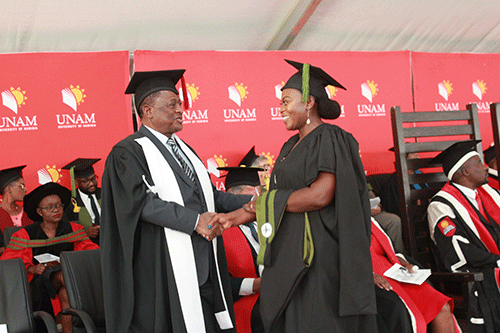The University of Namibia School of Medicine recently conferred honours on the first cohort of the Master of Medicine specialising in Anaesthesiology, Critical Care and Pain Management.
Dr Loini Talishi Shivolo (35) was one of four doctors to receive the qualification from the university.
Shivolo, who is currently the head of the department of Anaesthesia and Intensive Care Unit (ICU) at the Onandjokwe Intermediate Hospital, said her biggest motivator to pursue medicine was her father and his affirmations were crucial in her development.
“I decided to study medicine because of my late father. Every time I brought him my report card, he would call me his doctor. And so, it was instilled in me that I will be a doctor to make my father proud,” she told Youth Corner.
Hailing from the Iikologo village in Elim constituency in Omusati region, she said the scariest thing about being an anaesthetist is losing a patient on the table who was having minor surgery.
“Because of this fear, I have learned so much to make sure all patients coming to the theatre have safe anaesthesia. Yes, studying medicine is tough; one has to have a passion for reading a lot, at the same time being practical. Medicine evolves every day, it’s a whole lifetime of learning. A doctor never stops studying,” she said assertively.
Shivolo is grateful for this course and hopes that other domains such as surgery, internal medicine, and paediatrics among others, will also be offered at the university of Namibia.
Another graduate, Dr Mandiudza
Maria Murakwani (39) agrees with
Shivolo, saying it is an unbearable feeling to lose a patient under anaesthesia, something she will try by all means to avoid.
“It feels like a failure and it’s scary, but many a time you appreciate that you can do all you can but it’s still ultimately in God’s hands,” said Murakwani, who is currently a specialist anaesthetist/anaesthesiologist at the Windhoek Central Hospital.
The Greece-born Murakwani said she did not plan to become an anaesthesiologist; she had a passion for paediatrics and emergency medicine but due to shortages in terms of medical officers, she was allocated to the anaesthesia department, where she attained a postgraduate diploma in anaesthesia.
“Studying to be the best you can be is tough but rewarding. My advice is you need to be dedicated, hardworking and have passion for what you do with good communication skills and humility to be a productive team player in the good outcome of a patient.”
The postgraduate training in anaesthesia was developed in conjunction with the health ministry to address the needs in the department.
Unam chancellor Nangolo Mbumba said at the graduation ceremony that the development and distribution of specialists are an essential aspect of healthcare provision.
“Parasites, bacteria, viruses and other pathogens are constantly adapting and they lead to patients requiring specialist intensive care and surgery. For surgery to be safe and humane, you need anaesthesiologists,” he added.
Since the establishment of the School of Medicine in 2010, more than 500 graduates have been deployed in both public and private health facilities in various parts of the country.
– psiririka@nepc.com.na


